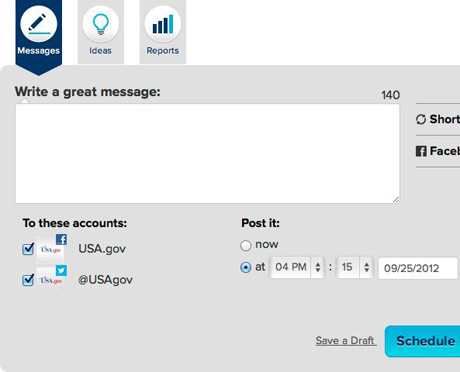Tool helps agencies manage social media messaging
Citizens are demanding a more responsive government.
Social media is here to stay. There is no question about that, especially after Facebook reached 1 billion users and Twitter surpassed the 500 million-account mark. What is less clear, however, is how government organizations can respond to the changing communication demands of citizens who want government to use social media in a meaningful, interactive and engaging fashion.
Agencies face a tough challenge: Citizens demand participation and responsiveness via social media – otherwise they complain or even mock government. But organizational missions and standard operating procedures do not allow for the fast and furious back-and-forth conversations on social networking sites. Instead, they mostly see social media as an additional channel for providing information to an audience that prefers to receive news and updates in a newsfeed. After all, government organizations are not in the business of competing for followers, fans, or to create peaks and spikes in their online communication. They are also not looking for volunteers, donors, or new customers whose interest they most spark over and over again to keep them coming back and buying their products.
In general, government missions are much simpler and focus on providing a trustworthy public service upon which citizens can rely. The existing information and communication paradigm is highly hierarchical with standard operating procedures that don’t necessarily support the 140-character news cycle. Instead, blog posts, Facebook and Twitter updates have to be carefully crafted to avoid confusion, rumors, and misinformation. There is rarely an update that goes out without revisions and explicit approval after carefully considering the potential impact or consequences. In this risk-averse communication environment, social media constitutes a departure from the existing standards.
Agencies' current approach to using social media focuses on broadcasting pre-existing information. They don't use social media channels to replace traditional media, instead they add social media channels to the mix and to share content that is also available through other channels, such as websites or mailings. Rarely do agencies and departments venture out to actively interact and engage in a conversational style in their newsfeeds on social media. A colloquial tone, sarcasm or jokes -- the Internet’s fuel -- can be misinterpreted or may even lead to misunderstandings. Many social media innovations develop as government officials experiment with different tactics, gain more experience, learn what tactics work and what should be avoided in the future.
In this new problem space, in which regulations and rules follow the changes in observed online behavior of citizens, it is necessary to create functions and standard operating procedures that help government agencies interact online. GSA has taken a first step and provides guidance on HowTo.gov : The social media registry was launched earlier this year. The tool allows government users to register their official social media accounts, so that journalists and researchers can verify their authenticity. This increases confidence in the nature of the account.
Similarly, internal workflows for crafting, reviewing, revising, and scheduling social media messages need to be designed to reduce the risks associated with the professional use of social media. An example is the recently launched “Measured Voice” social media workflow tool. Jed Sundwall, who presented the tool at the “Code for America Summit” in San Francisco in October, describes measured voice:
“ Government needs to be thoughtful about their social media postings. Agencies can’t post in real time answers to Facebook’s ‘What is happening?’. Instead, they have to be measured, reliable and accessible. They don't have to draw attention to themselves. ”
Sundwall, a contractor working on USA.gov and gobiernoUSA.gov , noticed early on that government agencies need a tool to organize their collaborative workflow in a distraction free environment to craft social media messages. The “Measured Voice” platform allows editorial teams to go back and forth during the editing process. Each team can define different roles: For example, writers craft the initial message, editors then rewrite and approve before the final messages are posted to an agency’s social media platform. The platform -- kept simple outside of Facebook and Twitter to avoid distractions -- helps to schedule updates: A feature that is especially important to avoid distractions from other important tasks government has to perform, for example emergency management situations or face-to-face interactions with citizens:


Source: Screenshot provided by Jed Sundwall, Measured Voice
Social media updates – fit into 140 characters on Twitter, or a few lines on Facebook -- absorb more time than a press release that allows more space for longer explanations. Sundwall points to a recent FBI update on Twitter that was carefully crafted and provided all the necessary information to diffuse the rumor that computers were stolen:

Source: https://twitter.com/FBIPressOffice/status/243089221529763840
As citizens and government experts become more social media savvy they will focus their activities more on networking opportunities that citizens demand and social media platforms support. Government organizations will also invest more in understanding if they are truly reaching the right audiences. Measuring the impact of social media interactions is therefore a core task that every agency should carefully consider. All social media interactions need to serve one purpose: to fulfill the mission of the organization. Only if online interactions are designed to support the mission will they provide both tangible and intangible benefits for government and its diverse audiences. Government agencies are just now starting to think about metrics that go beyond the quantitatively measurable insights, such as the number of retweets a Twitter update receives, or the number of Facebook comments citizens are willing to leave. There is, however, more: Social media engagement can be measured on different levels of an engagement scale.
- The number of retweets a Twitter update receives is an important indicator of short-term attention paid to a specific update or event and are mostly context-relevant.
- The number of followers and “likes” can indicate long-term community building and the degree to which citizens will actively follow updates -- an indication of continuing interest in government updates.
- Leaving comments or actively asking questions shows even more engagement – and at times even concern for mission-related issues.
Attracting too much attention, however, is not in the interest of most agencies (except emergency management agencies that are involved in ongoing disaster relief and prevention). Instead, for most agencies a continuous attention curve without many spikes and peaks is the best indicator that they are providing a reliable information flow to their audiences.
As Sundwall notes “ Government agencies are not out to advertise for ‘The best driver’s license in town’-attraction and don’t need to draw attention to their operations. ” Measured voice therefore looks at the 100-message average in attention and provides feedback to its users in the form of smileys. But don’t make them smile too much; there might be too much good or bad press waiting for you!
Metrics have become an invaluable source of real-time information for government -- when they measure the right type of engagement. Moreover, measuring for the sake of data accumulation will not help social media managers make their case. Instead, data needs to be carefully interpreted. Based on the insights government agencies should adjust their social media tactics.
Government users can sign up for the private beta of Measured Voice at http://measuredvoice.com/govbeta .






